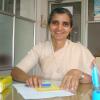"What storms approach? Can we believe in Christ we are not alone?"
Rep. Ryan, I am heartened that you value Pope Francis' call to dialogue. I also hope that if and when you read this letter, it will be received in the spirit with which it is intended — namely, dialogue.
See for Yourself - "Getting hit by a car wasn't pleasant in any way, as I ended up having several surgeries on my leg. But I can say that the entire experience was truly a blessing. No one believes that I feel this way, but I really do."
GSR Today - "Gail, you must learn so much from the sisters," family and friends often say. Indeed I do — and never has that been made clearer than in the past few weeks.
"The farthest star and the mud at our feet are a family; and there is no decency or sense in honoring one thing, or a few things, and then closing the list. The pine tree, the leopard, the river and ourselves -- we are at risk together, or we are on our way to a sustainable world together. We are each other's destiny."
From A Nun's Life podcasts - Sr. Cynthia Canning talks about helping people strive for their full potential.
In May 2008, when I joined a missionary archbishop in northeastern India, on his journey to interior villages; I began two journeys — one to interior villages and another into my own inner self.
Refugees and asylum-seekers seeking entry in the United States face separate, extensive processes that last years. Refugees are sent to a host country after extensive, multi-year vetting by the U.N. High Commissioner for Refugees that begins once they've left their homes and registered as refugees. Those who do not register cannot be resettled.
Many religious congregations support the program Asylee Women Enterprise, which has helped over 400 women asylum-seekers achieve independence. The congregations provide volunteering, housing for the women and financial aid for the center's program. The first woman who came to them, just before Christmas 2010, was pregnant and fleeing war-torn Afghanistan. "Sarah" had nowhere to go and didn't know anyone in her new country, where she hoped to gain asylum. The Benedictine Sisters of Baltimore took her in, and her baby boy was born on Jan. 6, the feast of the Epiphany.
"If we humans decide to break down all the barriers that separate us from one another and to see ourselves as intricately connected to one another, to the environment and to all of creation, we will have gone one step toward an end to all wars."






